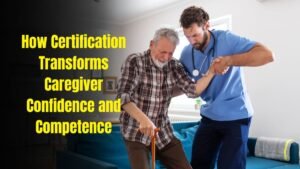In an age where chronic illnesses, aging populations, and mental health crises intersect, caregivers are often the backbone of support systems. Yet caregivers themselves are under immense stress—physically, emotionally, and psychologically.
Integrating mental health awareness into caregiver training is not just an added bonus; it is essential to providing holistic, sustainable, and compassionate care.
This article explores the most current evidence, data, and best practices around embedding mental health awareness, skills, and support into caregiver training programs
Why Mental Health Awareness in Caregiver Training Is Critical
1. The Mental Health Burden on Caregivers
Caregiving often carries hidden emotional costs. Studies show:
- In a 2024 U.S. analysis, caregivers exhibited worse outcomes on 13 out of 19 health indicators compared to non-caregivers, including higher rates of lifetime depression (25.6%) and frequent mental distress.
- The prevalence of lifetime depression among caregivers stood at 25.6%, compared to 18.6% among non-caregivers.
- A cross-sectional study in 2024 found caregiver burden, depression, and anxiety to be significantly correlated with caregiving tasks and duration.
- In caregivers broadly, 8.9% may meet diagnostic criteria for a major depressive episode.
- A systematic review in 2025 reported median prevalence rates of 33.35% for depression, 35.25% for anxiety, and 49.26% for burden among caregivers.
These statistics highlight that caregivers are a high-risk group for mental health challenges such as burnout, depression, anxiety, and distress.
2. Impact on Care Quality and Sustainability
When caregivers struggle psychologically, the quality of care delivered to recipients can suffer. Emotional exhaustion may reduce patience, attentiveness, and adherence to care protocols.
Over time, caregiver dropout and poor mental health may lead to negative outcomes for both caregiver and care recipient.
3. Demographic and Future Pressures
- As of 2023, 1.1 billion people worldwide were aged 60 years or over, and by 2030 one in six people will be over 60—amplifying caregiving demand.
- Among older adults aged 70 and over, ~14% live with a mental disorder, contributing to increased complexity in caregiving.
- Social isolation and loneliness are prominent risk factors for mental health decline in older populations.
In sum, the scale and complexity of caregiving demands mean mental health awareness must be foundational, not optional.
Core Principles and Components of Effective Training
To successfully integrate mental health awareness into caregiver training, certain guiding principles and content domains are essential.
1. Guiding Principles
- Person-Centered & Trauma-Informed — Recognize that both caregiver and care recipient bring histories, traumas, and preferences.
- Stigma Reduction — Break down myths and fears around mental illness.
- Skill-Building Orientation — Teach concrete skills (e.g. listening, de-escalation, self-care) rather than just theory.
- Reflective & Peer Learning — Provide opportunities for reflection, discussion, and support groups.
- Layered Support & Escalation Pathways — Ensure that training connects caregivers to professional mental health resources when needed.
- Ongoing & Modular — Training should not be a one-time event; refreshers and deeper modules are needed over time.
2. Key Content Components
Training should address:
- Mental health literacy: Basic understanding of disorders, symptoms, risk factors, and prevalence
- Psychological first aid / crisis response: Basic techniques to intervene safely in acute distress
- Communication & de-escalation: Skills to talk with someone experiencing anxiety, mood disturbance, or agitation
- Self-care, resilience, and stress management: Techniques to maintain caregiver wellbeing and prevent burnout
- Boundary-setting and role clarity: Ensuring caregivers know their limits and have tools to say “no” or ask for help
- Referral pathways and help-seeking: Awareness of community and professional supports, crisis lines, and mental health services
- Peer support and network building: Structure for caregivers to support one another
- Cultural competence & equity: Recognizing cultural influences on mental health and caregiving
- Monitoring & self-assessment: Tools for caregivers to self-monitor signs of distress
Some programs also embed bereavement support, grief work, and loss coping strategies for caregivers in end-of-life or long-term illness contexts.
Models & Strategies for Integration
Here we examine practical approaches to embed mental health awareness into caregiver training programs.
1. Standalone vs. Embedded Modules
- Standalone module: A dedicated mental health awareness module inserted into general caregiving training.
- Embedded curriculum: Mental health themes woven throughout all modules (e.g. while teaching mobility, also discuss frustration, stress, anxiety).
Many experts recommend an embedded approach so mental health is not siloed.
2. Evidence-Based Training Models
- MHFA (Mental Health First Aid): Widely used, evidence-based training that teaches how to recognize and respond to mental health and substance use issues.
- Institutions like the Cleveland Clinic have adopted MHFA for caregivers and staff.
- MHAT (Mental Health Awareness Training): A shorter, awareness-focused training geared toward gatekeepers and lay supporters.
- Caregiver-specific literacy programs: Tailored curricula that focus on the dual roles of caregiver and supporter, with mental health content built in.
- Psychosocial support & resilience programs: Combining stress management, mindfulness, cognitive behavioral techniques with caregiving skills.
3. Delivery Modalities
- In-person workshops with role-plays, simulations, case discussions
- Blended learning (e.g. online modules + in-person practice)
- E-learning / microlearning modules for flexible uptake
- Peer support groups / reflective circles
- Digital supports / chatbots / AI tools: For example, research from 2025 explores caregiver-focused chatbots offering emotional support, crisis escalation, and personalized guidance.
4. Levels of Integration
- Basic Awareness Tier: All caregivers receive a foundational mental health awareness protocol.
- Advanced Tier: Those working with high-risk populations (e.g. dementia, psychiatric illness) receive deeper training.
- Trainer & Supervisor Tier: Staff and managers receive “train-the-trainer” curricula, enabling sustainability.
5. Continuous Support & Follow-Up
Good programs include refresher modules, booster sessions, peer check-ins, and ongoing supervision/mentoring to reinforce learning and adapt to evolving challenges.
Barriers, Challenges & Solutions
Implementing mental health awareness into caregiver training is not without hurdles. Here are common challenges and how to address them.
| Barrier / Challenge | Implication / Risk | Possible Solutions |
|---|---|---|
| Stigma and resistance | Caregivers may resist mental health topics due to taboo, fear, or denial | Use stigma-reduction narratives, personal stories, normalization in orientation |
| Limited time or competing priorities | Training schedules often overloaded | Use modular microlearning; integrate mental health content into existing modules |
| Lack of expertise or trainers | Agencies may lack mental health professionals to train caregivers | Partner with mental health NGOs, use online course providers, “train-the-trainer” models |
| Insufficient funding | Additional modules or staffing may cost more | Seek grants, integrate into existing budgets, show ROI in fewer caregiver dropouts |
| Cultural and linguistic mismatch | Standard modules may not resonate across cultures or languages | Localize training, involve community leaders in co-design |
| Caregiver fatigue / burnout | Ironically, stressed caregivers may not engage in training | Offer flexible scheduling, incentive stipends, self-paced modules |
| Lack of referral infrastructure | Training without support pathways is ineffective | Map local mental health resources, build partnerships, create escalation protocols |
By anticipating and planning for these obstacles, organizations can increase uptake and impact.
Benefits & Measurable Outcomes
What happens when caregiver training integrates mental health awareness? The benefits are multi-layered—psychological, relational, systemic.
1. Improved Caregiver Wellbeing
- Reduced burnout and distress: Training in stress management, boundaries, mental health literacy helps protect caregivers.
- Earlier detection of caregiver mental health decline: Self-monitoring tools allow prompt referral.
- Higher engagement and retention: Caregivers feel supported, which reduces dropout.
2. Enhanced Care Quality
- Caregivers who understand the mental health dimensions of illness (e.g. depression, anxiety in recipients) are better at responding, communicating, and managing behavioral issues.
- Fewer adverse events (e.g. agitation, withdrawal, noncompliance) when mental health is proactively addressed.
3. Systemic and Organizational Gains
- Reduced costs over time—less caregiver turnover, less need for crisis interventions.
- Scalability & capacity-building: Trained caregivers can act as mental health “first responders” or gatekeepers in communities.
- Better reputation and holistic care alignment with modern integrated care frameworks.
4. Metrics to Monitor
Possible outcome metrics include:
- Changes in caregiver depression/anxiety scores pre- and post-training
- Rates of burnout, using validated instruments (e.g. Zarit Burden Interview)
- Caregiver retention / dropout rates
- Reported self-efficacy in managing mental health challenges
- Number of referrals made to mental health services
- Recipient-level outcomes (e.g. fewer behavioral crises, improved mental health)
Key Frameworks, Metrics & Models
| Domain / Focus | Key Content / Feature | Metric / Indicator | Model / Example |
|---|---|---|---|
| Mental Health Literacy | Symptoms of depression, anxiety, stigma reduction | Pre/post quiz scores, knowledge retention | MHFA, MHAT |
| Psychological First Aid | Crisis response, suicidality, de-escalation | Skill demonstration, scenario performance | Adapted PFA modules |
| Self-Care & Resilience | Stress management, breathing, sleep hygiene | Burnout scales, self-report well-being | Mindfulness, CBT-based modules |
| Communication & De-escalation | Active listening, empathy, boundary | Role-play assessment, feedback | Embedded in care modules |
| Referral & Escalation Pathways | Local mental health resources, protocols | Number of successful referrals | Partnerships with local agencies |
| Peer Support & Reflective Practice | Support circles, group debriefing | Attendance, qualitative feedback | Peer-led support groups |
| Cultural Adaptation | Local language, beliefs, customs | User satisfaction, cultural appropriateness | Co-designed with community |
| Sustainability & Trainer Capacity | Train-the-trainer, refreshers | Number of trainers certified, module updates | Tiered training cascade |
Integrating mental health awareness into caregiver training is no longer a “nice-to-have”—it’s a vital component of modern, humane care systems.
Caregivers face high rates of depression, anxiety, distress, and burnout; if left unsupported, the quality of care and caregiver sustainability suffers.
By embedding mental health literacy, crisis response, communication skills, self-care, referral pathways, and peer support into caregiver training, we honor both the provider and recipient of care.
While challenges exist—time constraints, stigma, funding—the benefits are profound: healthier, more resilient caregivers; improved care outcomes; and systems that truly reflect the interconnectedness of physical and mental health.
With thoughtful design, ongoing support, and outcome measurement, caregiver training programs can evolve into holistic platforms that nurture not only bodies but min
FAQs
Why is integrating mental health awareness important for caregivers?
Because it helps caregivers recognize stress, manage emotions, and prevent burnout, improving both their well-being and patient care quality.
How can mental health awareness be included in caregiver training programs?
By adding modules on stress management, self-care, communication skills, and recognizing mental health issues in themselves and patients.
What benefits do caregivers gain from mental health-focused training?
They gain resilience, emotional stability, and confidence in handling difficult situations, which leads to better caregiving and job satisfaction.




